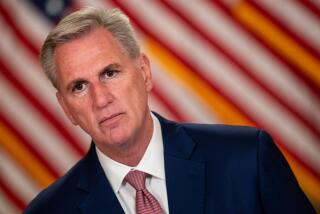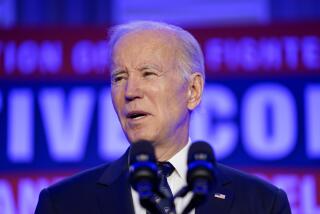Paying the Piper
- Share via
It is time that Americans stop allowing themselves to be seduced by the notion they can have all the governmental goodies that they want without paying for them. While President Reagan denounced Congress all these years for being hooked on the idea of tax and spend, his Administration has engaged in a wholesale program of borrow and spend. As late as Wednesday he went to the Capitol and tried to apply his just-say-no drug message to taxes.
But time, and the horrendous federal debt, has rendered that message obsolete if not downright dangerous. After trillion-dollar defense increases and trillion-dollar tax reductions, the piper must be paid. A modest, even timid, down payment is the roughly $18-billion tax increase proposed by Democratic budget-makers in Congress.
Recent polls suggest that Americans are prepared to accept higher taxes to pay for expanded social programs. The Democrats’ budget outline would not in fact prevent additional cuts in domestic spending. It would not even prevent the nation from going further into debt. But at least it would help brake the slide into an abyss of red ink.
The obvious place to start is with an overdue increase in excise taxes on alcoholic beverages, tobacco and gasoline. The $18.5 billion could be raised this way: doubling the cigarette tax from 16 cents a pack to 32 cents; doubling the federal gasoline tax from 9 cents to 18 cents; increasing the tax on distilled alcohol from $12.50 a gallon to $15 a gallon, and making the beer and wine tax comparable to that on distilled spirits.
None of these increases would work a severe hardship on the public. Each might have a beneficial social effect by modestly discouraging excessive smoking and drinking and encouraging gasoline conservation. They would produce no real drag on economic growth.
The beer and wine tax has not been raised since 1951. The tobacco tax is only about 15% of the market price of cigarettes, compared with 42% in 1951. As for gasoline, the U.S. tax levy on motor fuel is one of the lowest in the world, with many other countries charging as much as $1 a gallon. The special interests involved, particularly beer and wine and tobacco, have used their lobbying muscle to get a free ride for years. Excise taxes amount to less than 4% of the gross national product, compared with almost 9% in 1971.
An argument can be made that raising these taxes is good public policy even absent the budget deficit. Given the magnitude of the debt today, an increase is essential.
More to Read
Get the L.A. Times Politics newsletter
Deeply reported insights into legislation, politics and policy from Sacramento, Washington and beyond. In your inbox twice per week.
You may occasionally receive promotional content from the Los Angeles Times.










